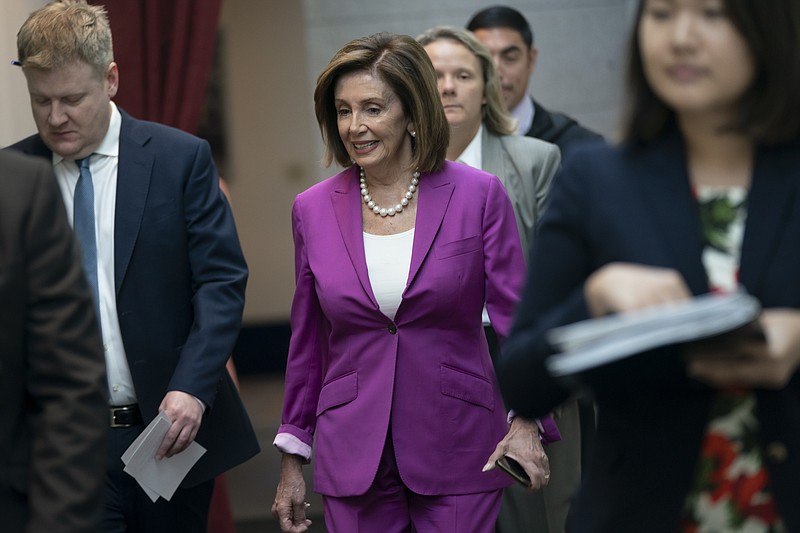WASHINGTON (AP) - The Democratic-led U.S. House voted Tuesday night to condemn President Donald Trump's "racist comments" against four congresswomen of color, despite protestations by Trump's Republican congressional allies and his own insistence he hasn't "a racist bone in my body."
Two days after Trump tweeted that four Democratic freshmen should "go back" to their home countries - though all are citizens and three were born in the U.S.A. - Democrats muscled the resolution through the chamber by 240-187 over near-solid GOP opposition.
The rebuke carries no legal repercussions, but the highly partisan roll calls suggests it is unlikely to cost Trump with his conservative base.
Despite a lobbying effort by Trump and party leaders for a unified GOP front, four Republicans voted to condemn his remarks: moderate Reps. Brian Fitzpatrick, of Pennsylvania; Fred Upton, of Michigan; Will Hurd, of Texas; and Susan Brooks, of Indiana, who is retiring. Also backing the measure was Michigan's independent Rep. Justin Amash, who left the GOP this month after becoming the party's sole member of Congress to back a Trump impeachment inquiry.
Before the showdown roll call, Trump plunged forward with insults. He accused his four outspoken critics of "spewing some of the most vile, hateful and disgusting things ever said by a politician" and added, "If you hate our Country, or if you are not happy here, you can leave!" - echoing taunts long unleashed against political dissidents rather than opposing parties' lawmakers.
The president was joined by House Minority Leader Kevin McCarthy, of California, and other top Republicans in trying to redirect the focus from Trump's original tweets, which for three days have consumed Washington and drawn widespread condemnation. Instead, they tried playing offense by accusing the four congresswomen - among the Democrats' most left-leaning members and ardent Trump critics - of socialism, an accusation that's already a central theme of the GOP's 2020 presidential and congressional campaigns.
Underscoring the stakes, Republicans formally objected after Speaker Nancy Pelosi, of California, said during a floor speech that Trump's tweets were "racist." Led by Rep. Doug Collins, of Georgia, Republicans moved to have her words stricken from the record, a rare procedural rebuke.
After a delay exceeding 90 minutes, No. 2 House Democrat Steny Hoyer, of Maryland, said Pelosi had indeed violated a House rule against characterizing an action as racist. Hoyer was presiding after Rep. Emanuel Cleaver, of Missouri, stormed away from the presiding officer's chair, lamenting, "We want to just fight," apparently aimed at Republicans. Even so, Democrats flexed their muscle, and the House voted afterward by party line to leave Pelosi's words intact in the record.
Some rank-and-file GOP lawmakers have agreed Trump's words were racist, but on Tuesday, party leaders insisted they were not and accused Democrats of using the resulting tumult to score political points. Among the few voices of restraint, Senate Majority Leader Mitch McConnell said Trump wasn't racist, but he also called on leaders "from the president to the speaker to the freshman members of the House" to attack ideas, not the people who espouse them.
"There's been a consensus that political rhetoric has gotten way, way heated across the political spectrum," said the Republican leader from Kentucky, breaking his own two days of silence on Trump's attacks.
Hours earlier, Trump tweeted, "Those Tweets were NOT Racist. I don't have a Racist bone in my body!" He wrote that House Republicans should "not show 'weakness'" by agreeing to a resolution he labeled "a Democrat con game."
Rep. Alexandria Ocasio-Cortez, of New York, one of Trump's four targets, returned his fire.
"You're right, Mr. President - you don't have a racist bone in your body. You have a racist mind in your head and a racist heart in your chest," she tweeted.
The four-page Democratic resolution said the House "strongly condemns President Donald Trump's racist comments that have legitimized and increased fear and hatred of new Americans and people of color." It said Trump's slights "do not belong in Congress or in the United States of America."
Trump's criticism was aimed at four freshman Democrats who have garnered attention since their arrival in January for their outspoken liberal views and thinly veiled distaste for Trump: Ocasio-Cortez and Reps. Ilhan Omar, of Minnesota; Ayanna Pressley, of Massachusetts; and Rashida Tlaib, of Michigan. All were born in the U.S. except for Omar, who came to the U.S. as a child after fleeing Somalia with her family.
The four rebellious freshmen joined Rep. Steven Cohen, of Tennessee, and a handful of others who wanted the House to vote on a harsher censure of Trump's tweets. And Rep. Al Green, of Texas, was trying to force a House vote soon on whether to impeach Trump - a move he's tried in the past but lost, earning opposition from most Democrats.

